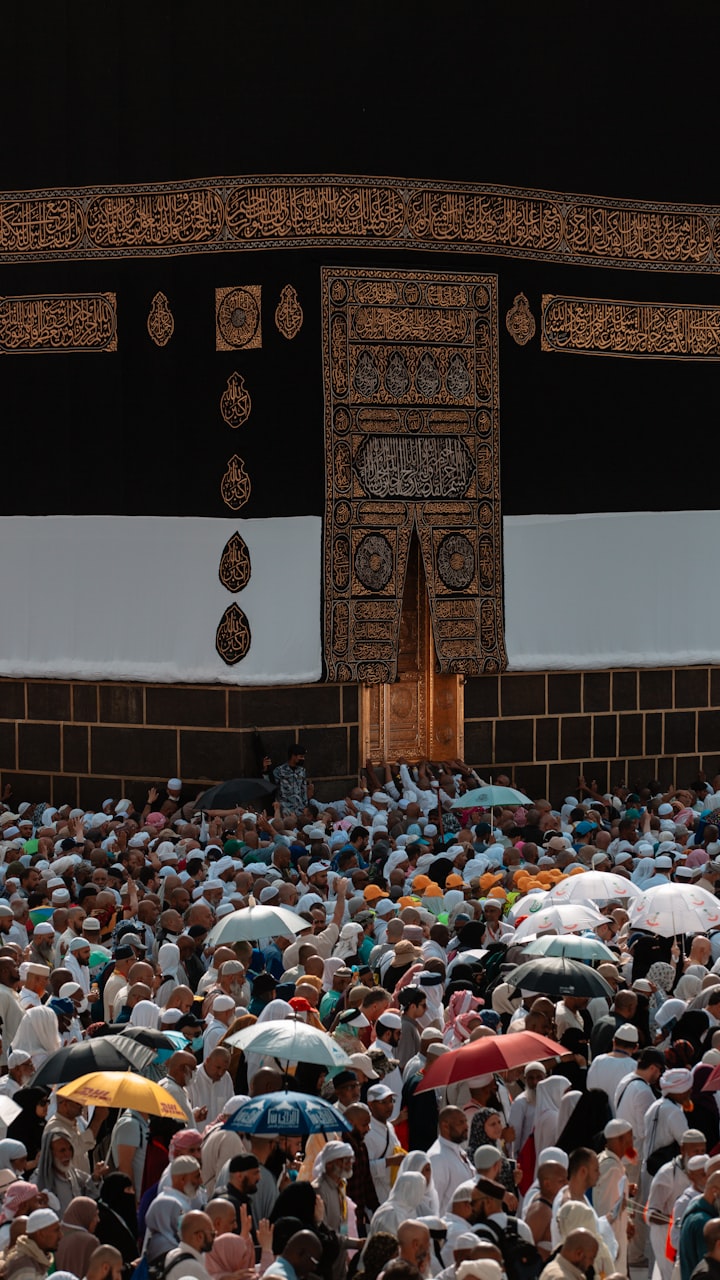The Five Pillars of Islam: A Spiritual Foundation Anchored in Quranic and Hadith Teachings
Islamic Stadies

بسم الله الرحمن الرحيم
"In the name of Allah, the Most Gracious, the Most Merciful."
Islam, one of the world's major monotheistic religions, is built upon a framework known as the Five Pillars. These pillars form the foundation of a Muslim's faith and practice, guiding them in their daily lives and fostering a deep connection with Allah. Rooted in the teachings of the Quran and the Hadith (sayings and actions of Prophet Muhammad (Sāllāllāhu alaihi ōẏā sālāmā ), the Five Pillars serve as a spiritual compass for Muslims around the globe.
1. **Shahada (Declaration of Faith):**
The first and foremost pillar of Islam is the Shahada, the declaration of faith. Muslims bear witness that "There is no god but Allah, and Muhammad (Sāllāllāhu alaihi ōẏā sālāmā ) is His Messenger." This simple yet profound statement encapsulates the core of Islamic belief – the oneness of Allah and the acceptance of Prophet Muhammad (Sāllāllāhu alaihi ōẏā sālāmā ) as His final messenger. This declaration is drawn directly from the Quran, where Allah states in Surah Al-Baqarah (2:255), "There is no deity except Him, the Ever-Living, the Sustainer of existence."
The Hadith further emphasizes the significance of Shahada, with Prophet Muhammad (Sāllāllāhu alaihi ōẏā sālāmā ) stating, "Whoever witnesses that there is no god but Allah and that Muhammad (Sāllāllāhu alaihi ōẏā sālāmā ) is His messenger will not enter the Hellfire" (Sahih Muslim). The Shahada serves as the bedrock of a Muslim's faith, shaping their worldview and informing their actions.
Salah, or ritual prayer, is the second pillar and serves as a direct means of communication between the worshipper and Allah. Muslims are required to perform five daily prayers, each at specified times – Fajr, Dhuhr, Asr, Maghrib, and Isha. The Quran repeatedly emphasizes the importance of prayer, with Surah Al-Baqarah (2:238) stating, "Guard strictly your prayers, especially the middle prayer, and stand before Allah with all devotion."
Prophet Muhammad (Sāllāllāhu alaihi ōẏā sālāmā ) through various Hadiths, highlighted the significance of Salah in a Muslim's life. One such Hadith states, "The first thing a person will be accountable for on the Day of Judgment is prayer. If it is sound, then the rest of his deeds will be sound; and if it is corrupt, then the rest of his deeds will be corrupt" (Sunan Ibn Majah). Salah not only fulfills a religious obligation but also fosters discipline, mindfulness, and a constant awareness of Allah's presence.
The third pillar, Zakat, emphasizes the importance of social responsibility and wealth distribution within the Muslim community. Muslims who possess a certain amount of wealth are obligated to give a portion of it (usually 2.5%) to those in need. The Quran emphasizes the concept of Zakat, stating in Surah Al-Baqarah (2:267-269), "O you who have believed, spend from the good things which you have earned and from that which We have produced for you."
Prophet Muhammad (Sāllāllāhu alaihi ōẏā sālāmā ) , through his teachings, reinforced the significance of Zakat in fostering compassion and reducing economic disparity. He stated, "The believer's shade on the Day of Resurrection will be his charity" (Al-Tirmidhi). Zakat is not merely a financial transaction; it is a means of purifying one's wealth and contributing to the welfare of the community.
4. **Sawm (Fasting during Ramadan):**
The fourth pillar, Sawm, refers to the observance of fasting during the month of Ramadan. Muslims abstain from food, drink, and other physical needs during daylight hours, fostering self-discipline, empathy for the less fortunate, and spiritual growth. The Quran prescribes fasting in Surah Al-Baqarah (2:183), stating, "O you who have believed, decreed upon you is fasting as it was decreed upon those before you that you may become righteous."
Prophet Muhammad (Sāllāllāhu alaihi ōẏā sālāmā ) provided further guidance on the significance of fasting in various Hadiths, including one where he said, "Fasting is a shield; so when one of you is fasting, he should neither indulge in obscene language nor should he raise his voice in anger" (Sahih Bukhari). Sawm serves as a means of self-purification and strengthening one's connection with Allah.
5. **Hajj (Pilgrimage to Mecca):**
The fifth and final pillar, Hajj, represents the pilgrimage to the holy city of Mecca, an obligation for every financially and physically capable Muslim at least once in their lifetime. The Quran emphasizes the significance of Hajj in Surah Al-Imran (3:97), stating, "And Hajj to the House [Kaaba] is a duty that mankind owes to Allah, those who can afford the expenses."
Prophet Muhammad's (Sāllāllāhu alaihi ōẏā sālāmā ) Hadiths provide detailed guidance on the rituals of Hajj, underscoring the spiritual significance of this journey. One such Hadith states, "Whoever performs Hajj for the sake of Allah and does not commit any obscenity or transgression will return free from sins as on the day his mother gave birth to him" (Sahih Bukhari).
In conclusion, the Five Pillars of Islam are not merely rituals but a comprehensive guide for a Muslim's spiritual and practical life. Rooted in the teachings of the Quran and the Hadith, these pillars offer a roadmap for believers to navigate their journey towards Allah, fostering a sense of purpose, discipline, and compassion within the Muslim community. As Muslims strive to uphold these pillars, they find themselves on a path of spiritual growth, social responsibility, and a profound connection with the divine.
About the Creator
Tushar1770
In 2024, my goals as a writer involve refining my style, embracing multimedia, fostering community engagement, and seeking collaborative opportunities. Excited to explore creative expression in the evolving digital landscape!






Comments
There are no comments for this story
Be the first to respond and start the conversation.